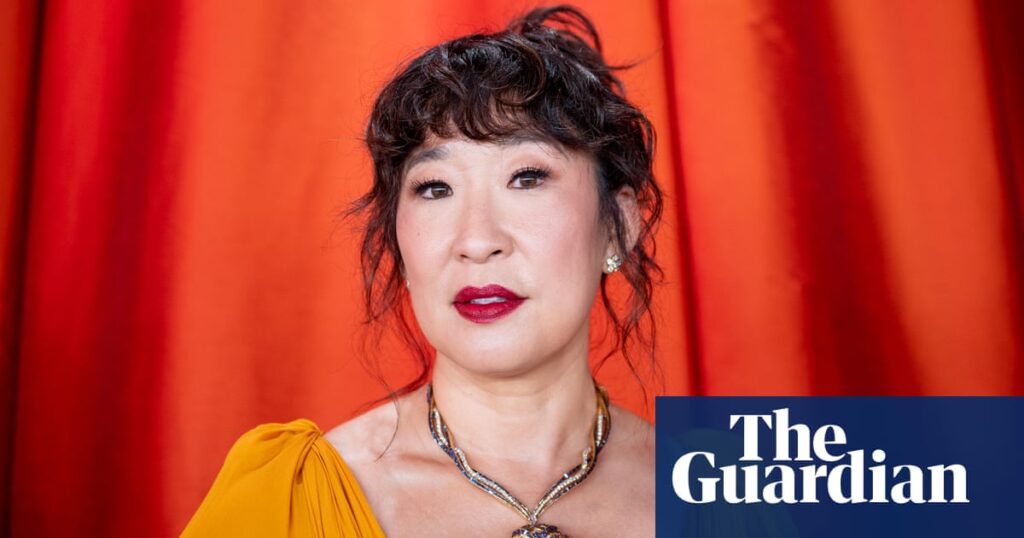
This summer, Sandra Oh captivated an audience at a graduation ceremony in New Hampshire, delivering a powerful message of hope amidst global turmoil. Standing behind a lectern, she shared personal battles with depression and anxiety, urging graduates to embrace discomfort and kindness to maintain humanity in a world where many leaders wield power through fear and oppression. Her speech crescendoed with a viral moment, as she encouraged everyone to “Dance it out!” to David Guetta’s “Titanium,” a nod to her iconic character Cristina Yang from Grey’s Anatomy.
“I was very, very, very nervous about it,” Oh admitted, reflecting on the effort she put into connecting with young adults burdened by the state of the world. “The world is burning!” she imagined them thinking, highlighting their concerns over wars and environmental crises. Yet, her message was clear: find joy amidst despair. “Sitting there trying to bear the pain in the world,” she explained, “will help you figure out how to be in the world.”
From Personal Struggles to Public Advocacy
Oh’s speech, rich with vulnerability and compassion, resonates with her public persona. Born in Ottawa to Korean immigrant parents, she has become a symbol of representation in Hollywood, being the first Asian woman to win multiple Golden Globes. Her advocacy for diversity is encapsulated in the popular phrase she coined at the Emmys: “It’s an honour just to be Asian.”
Speaking from New York, Oh’s conversation is a mix of humor and reflection, touching on issues from climate change to racial equality. Her latest project, the indie Canadian sci-fi film Can I Get a Witness?, explores themes of survival and societal rebirth following an AI-driven apocalypse in 2025. Set in 2040, the film imagines a world where peace is achieved, but at the cost of personal freedoms, including a government-mandated death at 50.
Exploring Life and Death
“I was most interested in the script’s contemplation of dying,” Oh said, pondering how awareness of imminent death alters life’s approach. This theme struck a chord during an early screening in Santa Barbara, as wildfires raged nearby, underscoring the film’s relevance. “It is what’s happening right now,” she asserted. “We are in the burning right now.”
Oh’s collaboration with director Ann Marie Fleming included a request to incorporate AI into the narrative, reflecting her concerns about technology’s impact. “Phones and social media,” she observed, “are retraining human beings at an unconscious, very powerful level.”
Choosing Meaningful Work
In response to technological shifts, Oh chooses “small, profoundly meaningful” projects and theater, such as her role as Olivia in Twelfth Night at Central Park’s Delacorte Theater. “Engaging with 2,000 people in an open-air theatre,” she noted, “you’re in community and you’re communing – through Shakespeare.” In an era dominated by machines, such interactions gain significance.
Oh emphasizes the importance of conscious choices, a perspective she attributes to midlife. “There is so much in culture, in society, that you’ve been living in unconsciously,” she explained. “But you see that crack of light coming through – and realize that’s what you want to follow.”
A Legacy of Representation
Oh’s career reflects her commitment to representation, with roles in projects like Turning Red, Umma, and The Chair that highlight her Asian heritage. “When I started, actors like Daniel Dae Kim or John Cho – we’d known each other forever, but we never shared a stage or set,” she recalled, underscoring the industry’s evolution. “The door that’s opened in the past 10 years – or not even that – seven years – remains open.”
Her comments on the industry’s patriarchal tendencies, including a viral quote comparing it to a “bad boyfriend,” underscore her focus on nurturing new talent. “Go where you’re wanted,” she advised, citing collaborations with creators like Shonda Rhimes and Phoebe Waller-Bridge.
Reflecting on the Past, Looking to the Future
At a New York live podcast event, Oh read from her old diary, revisiting a painful encounter with an agent who doubted her prospects in Hollywood. “The pain’s the same and overwhelming,” she wrote then. To her younger self, she now offers reassurance: “I’m so sorry it’s so painful right now. But it will change.”
Oh’s journey, marked by resilience and advocacy, continues to inspire. Her message to graduates and audiences alike is clear: embrace the discomfort, find joy, and actively shape a more inclusive world.





